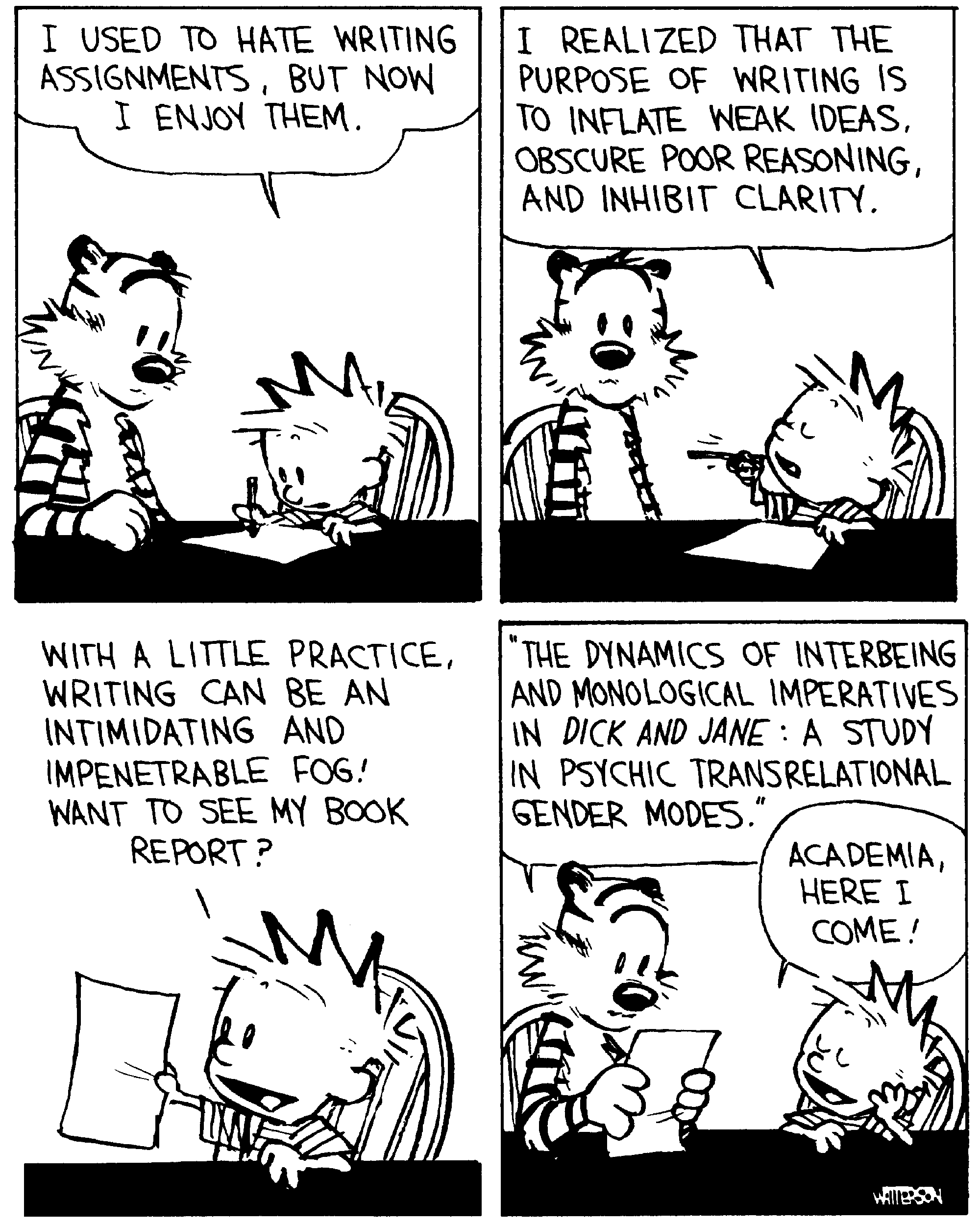Not that I can blame them. Academic disciplines pick up in-group codes and lingo. I have a great interest in physics, but my one class in the subject foundered on my professor’s frequent recourse to jargon. I try to make my class as straightforward and free of buzzwords as possible, but many others don’t share that value. Especially in college, where professors aren’t trained in classroom management, teachers and students often speak completely separate languages.
The other day I overheard my manager—one of the few other workers with a college degree—speaking with another employee. My boss, “Miranda,” admitted that, while she liked most of college, writing-intensive classes drove her nuts. There seemed so many rules, such onerous restrictions, that writing got between her and learning. So she had absolute sympathy with anyone, like the worker she was speaking with, who finds learning a long row to hoe.
That’s when I realized the problem. Many pedogogical theorists have all kinds of theories to explain why students struggle in this class or that one. Some critics think English class divides people according to the development of the corpus callosum, the organ that joins human brain hemispheres, since reading and writing require both hemispheres. Others suggest that English success is class-based, since the poor have little time to read. I say: maybe.
More likely, students stumble on the highly artificial act of “writing a paper.” This act bears little resemblance to any form of technical, scholarly, or aesthetic writing performed by working writers. Comparing the writing done in most classrooms with most novelists, critics, and other people who make their living arranging words on paper, my students might be astonished by how little the two processes have in common.
In public school, my teachers hit me with strange rules about writing. I needed to arrange paragraphs with a topic sentence, supporting claims, and a summation. Paragraphs need a minimum of three sentences. Papers should consist of neither more nor less than five paragraphs. The first sentence of the first paragraph should state the point of the entire paper, and the first paragraph should include a complete summary of everything which will follow.
I balked at these rules as early as eighth grade. The writers I read for fun don’t do these. They stagger sentence and paragraph lengths. Few writers use topic sentences, and thesis statements are optional at best. As I advanced in writing, I learned that working writers seldom use other tools I’d learned as mandatory, like outlines and note cards. This tendency to treat certain writers’ tools as universal makes a straightforward expressive art falsely imposing.
But I had the greatest problem with the route my papers followed. I would spend hours, days, sometimes weeks working on a single paper, which I would show to one teacher, and the arc would be complete. I had no audience. There was no sense of participation in any larger communication. No one would ever respond to my work, because nobody but my teacher—who may or may not read the whole paper—would ever see it.
It felt like throwing my words into a vacuum.
 The ability to translate abstract thoughts into words isn’t trivial. As I've written before, people have fought for the liberty to speak with others who aren’t right in front of them. The neurological development that comes with the ability to read and write also correlates with business and professional skills. Simply put, even people who don’t make a living as writers see their economic potential improved by perfecting the ability to communicate in writing.
The ability to translate abstract thoughts into words isn’t trivial. As I've written before, people have fought for the liberty to speak with others who aren’t right in front of them. The neurological development that comes with the ability to read and write also correlates with business and professional skills. Simply put, even people who don’t make a living as writers see their economic potential improved by perfecting the ability to communicate in writing.But school hampers that freedom. It shackles expression to regulations and limitations. It threatens students with punishment if they violate systems that they knowl are completely artificial. Small wonder so many, even those who write recreationally, balk at classroom writing requirements. Saying we write to uphold the rules is like saying we have children so they can get jobs that enrich others without nourishing their souls.
Or is that in fact what we are saying?


I think about J.S. Bach, Beethoven, Mozart, and other truly great writers (of music). What did they do, which makes their sentences, paragraphs, chapters, and books so amazing? Every key has a major and a minor mode, giving us 24 musical geometries of naturals, sharps, and flats, to work with in any given musical scale. So D major, has D, E, F#, G, A, B, C#, D, for example. These letters are combined into musical phrases, with pauses, volume, rapidity, and a whole host of other dynamics which gives expression to the IDEA of the work. This idea is what the composer actually started with, as the greats will tell you in their letters and other biographical material. Everything else, the mode, tempo, etc. is subservient to the idea. How insane would it have been, were Beethoven to have composed his 9th symphony by the number of C#s in his opening theme of the fourth movement?
ReplyDeleteMr. Nenstiel, you've hit the nail on the head. Our educational system is not trying to enrich the souls of our children, it's trying to formalize education into following arbitrary rules. These rules are so formal, they prevent creative thought, out of fear of getting a "bad grade". Break the system, sir, by teaching people how to reproduce the original discoveries.